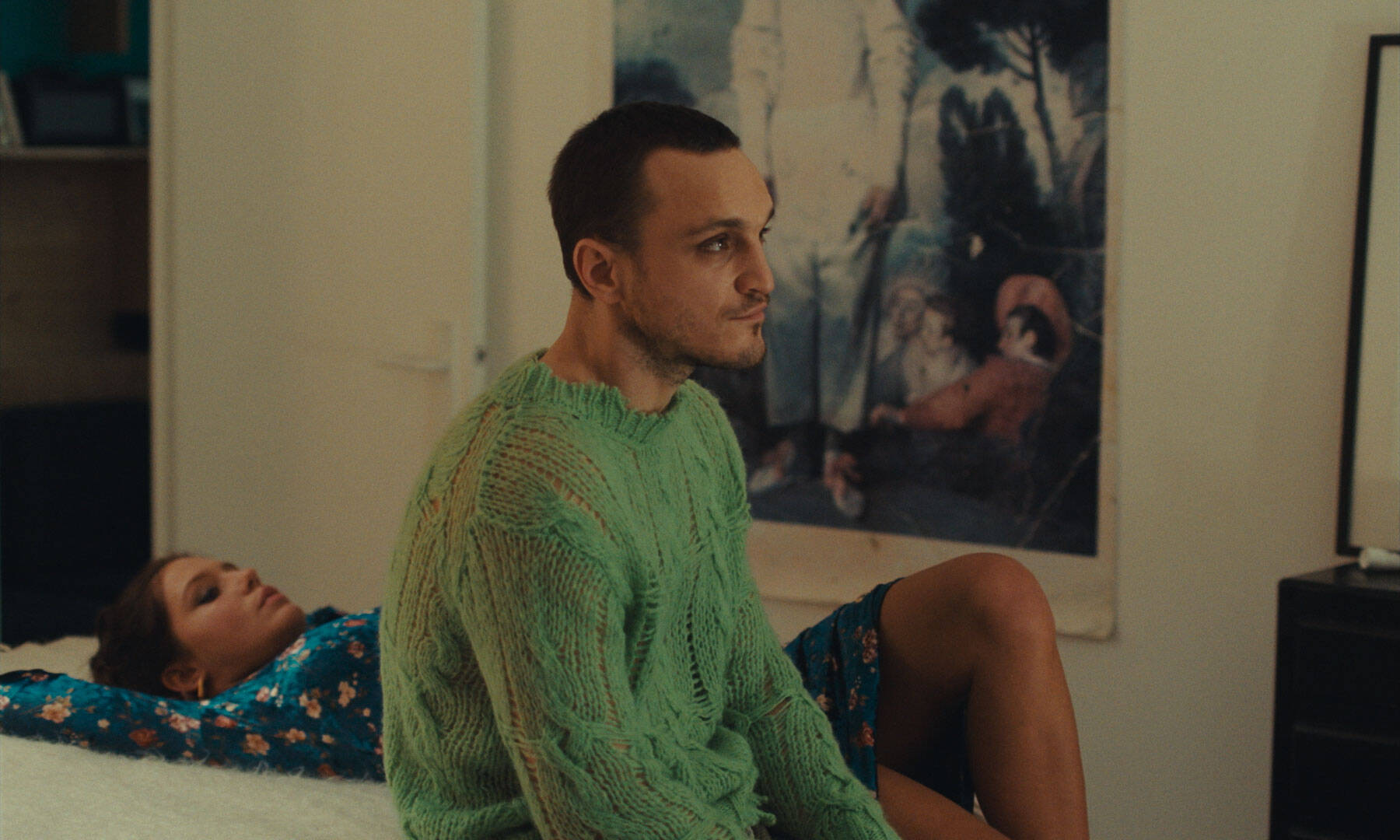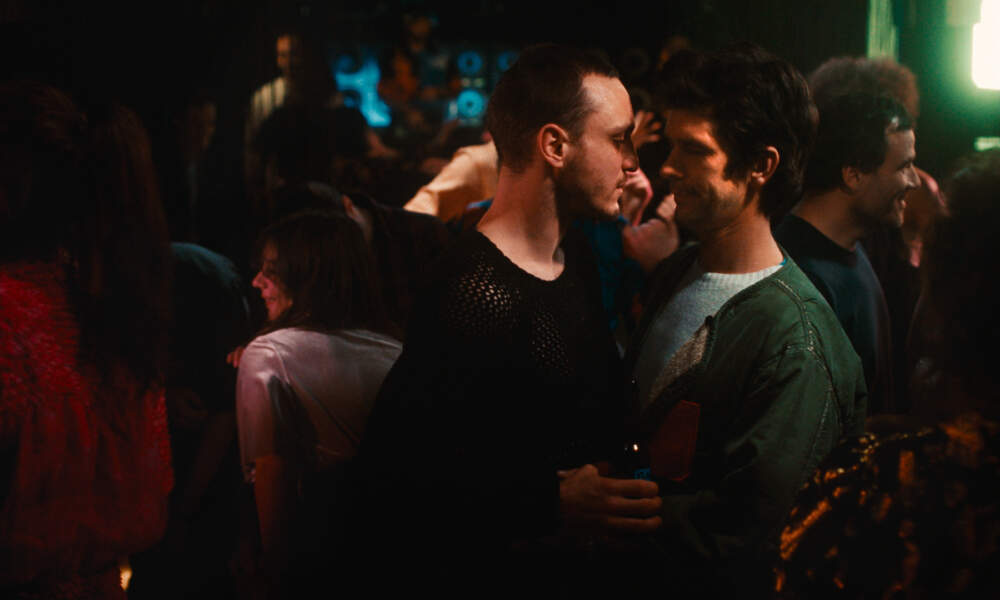Advertisement
Review
In the new adult drama 'Passages,' the erotic encounters tell a story

“I had sex with a woman last night. Can I tell you about it, please?” says Tomas (Franz Rogowski) to his husband Martin (Ben Whishaw) over breakfast one morning near the start of Ira Sachs’ searing, refreshingly adult drama “Passages.” It’s the “please” that really puts the scene over. Tomas is so boyishly excited to share details of his infidelity that you can’t help but laugh at the obliviousness of his affront. Martin, for his part, is running late for work and has heard it all before, reminding his husband on the way out the door that something like this always happens whenever he finishes a film.
Tomas is a movie director of some acclaim, and at the previous evening’s wrap party found himself on the dance floor with a production assistant named Agathe (Adèle Exarchopoulos) when one thing led to another. He’s a piece of work, this Tomas. Not conventionally attractive but magnetic in a rotten kind of way, he’s one of those guys who always look a little dirty, resembling a cross between Vincent Gallo and Rainer Werner Fassbinder decked out in mesh shirts and too-tight, loud print pants. Rogowski has wide, pleading eyes and a lisp that softens his screaming tirades. He’s at his most self-pitying when behaving monstrously — as if the feelings of others have honestly never occurred to him. The arguments Tomas starts all tend to end with Martin consoling him, an unhealthy routine they have down to a science.
“Passages” is about how this dysfunctional couple becomes a toxic love triangle. What was to be a one-night stand with Agathe accelerates after the two discover they're unable to stop pawing at each other in his production office. Everyone attempts to be blasé about it at first. After all, this is Paris in 2023, and they’re sophisticated members of an artistic community, so there’s no need to get hung up on labels or gender roles. And yet. The mercurial Tomas can’t help but exacerbate the situation by only wanting whoever he isn’t with at the moment, compulsively ruining everything and then running back and forth between lovers. A brilliant young author (Erwan Kepoa Falé) momentarily caught in their abusive orbit warns Martin, “You can’t see it, but you won’t survive this. Either of you.”

Tomas is such an enormous, suffocating personality that Martin and Agathe can sometimes feel crowded out of the movie by his temper tantrums and self-generated crises. At key dramatic moments, Sachs and cinematographer Josée Deshaies position Rogowski in the frame so that he obscures the faces of his co-stars — a clever formal expression of the character’s all-encompassing selfishness. Whishaw and Exarchopoulos are warm, appealing screen presences, so you’re rooting for Martin and Agathe to escape this dirtbag’s inexorable gravitational pull. (I’ve heard “Passages” described as a horror movie about a bad boyfriend.) As is the case with many bad relationships, people stick around longer than they should for a lot of complex reasons, not the least of which is that the sex is so good.
“Passages” made the news last month when distributor MUBI elected to release the film without a rating after being slapped with an NC-17 by the Motion Picture Association’s Classification and Rating Administration. In fact, if you’ve heard anything about the picture at all, it probably has something to do with the sex scenes, which are sensitively staged by Sachs and performed by the actors with a frankness that’s all but unheard of in contemporary cinema. Hardly gratuitous or exploitative, these interludes are shot in single, unbroken takes, during which the actors usually remain at least partially clothed. The point is not to play peek-a-boo with people’s private parts but rather to show how these characters communicate during their most intimate moments and the shifts in power dynamics that take place therein. Some people like to complain that sex scenes in films don’t advance the story, but in the case of “Passages,” the sex scenes are the story. Every erotic encounter serves a narrative purpose. The movie wouldn’t make any sense without them.

Sachs is a New York filmmaker best known for gentle, gay-themed dramas such as 2016’s “Little Men” and 2014’s adorable “Love is Strange,” which starred Alfred Molina and John Lithgow as a longtime couple separated by circumstance and learning to live with roommates again at an advanced age. Co-written with his regular collaborator Mauricio Zacharias, the new film is more akin to Sachs' rawer, earlier work like his 1996 debut “The Delta” or 2012’s lacerating, semi-autobiographical “Keep the Lights On.” One of the only movies I saw at this year’s Sundance Film Festival to demonstrate any daring, “Passages” is a throwback to the bristling relationship dramas of French filmmaker Maurice Pialat, whose 1983 “A Nos Amours” and 1972 “We Won’t Grow Old Together” shared a similarly pitiless gaze at doomed and damaged couplings.
A few critics have asked why anyone would want to spend 91 minutes watching people emotionally destroy themselves like this. You might as well ask why we always slow down to gawk at traffic accidents. “Passages” can also be appallingly funny, like when Tomas blows in late for a lunch date to meet Agathe’s stuffy, old-fashioned parents for the first time, still sweaty from a marathon sex session with Martin and wearing a sheer, dragon-print crop top. The carefully edited film’s sleek running time is presumably strategic, as any more than an hour-and-a-half with Tomas would probably be unbearable. But as the film’s haunting final shots remind us, he has to live with himself all day long.
“Passages” opens Friday, Aug. 11 at the Coolidge Corner Theatre. Director Ira Sachs will take part in a Q&A following the 4 p.m. showing on Sunday, Aug. 13.
